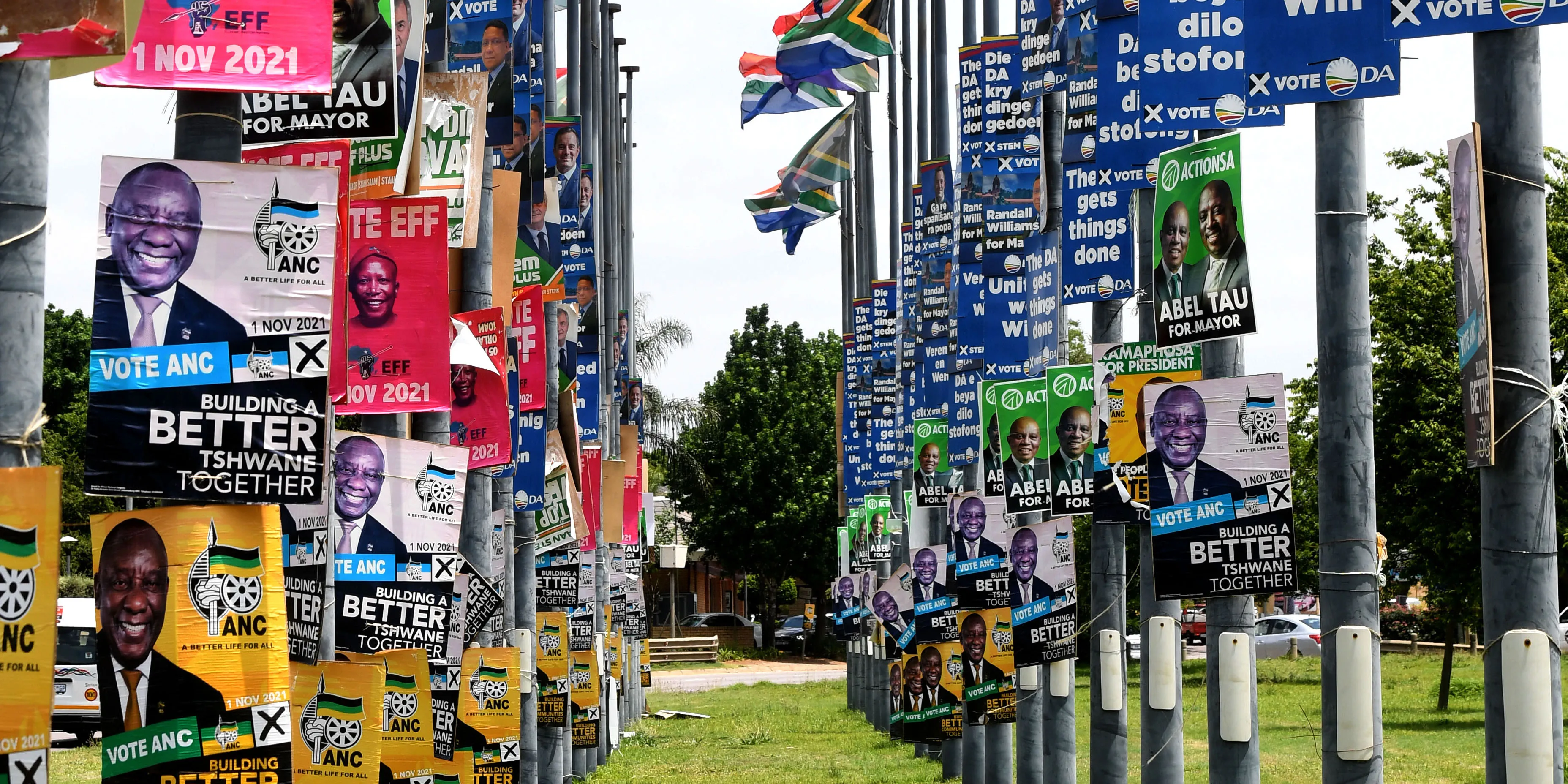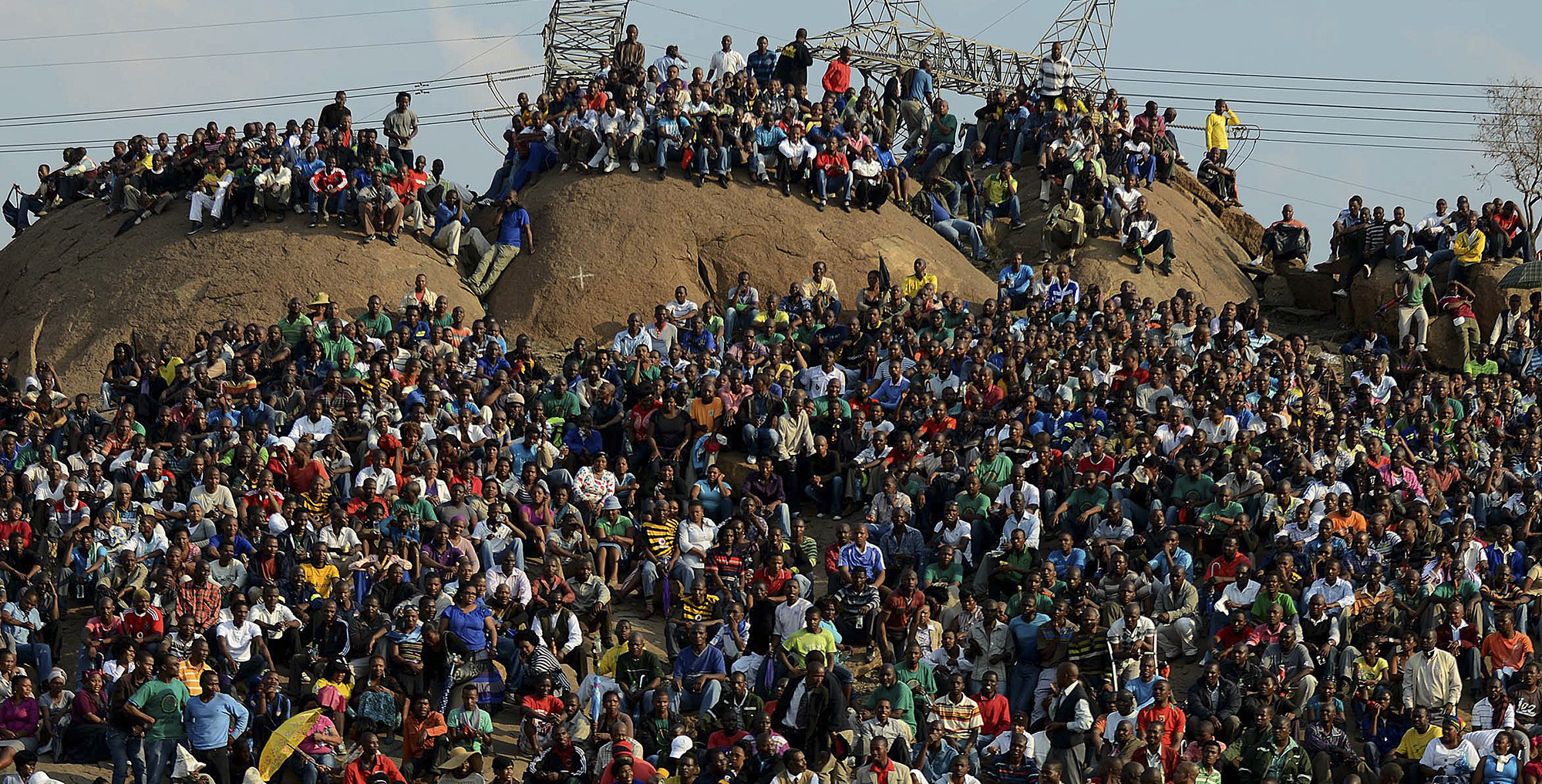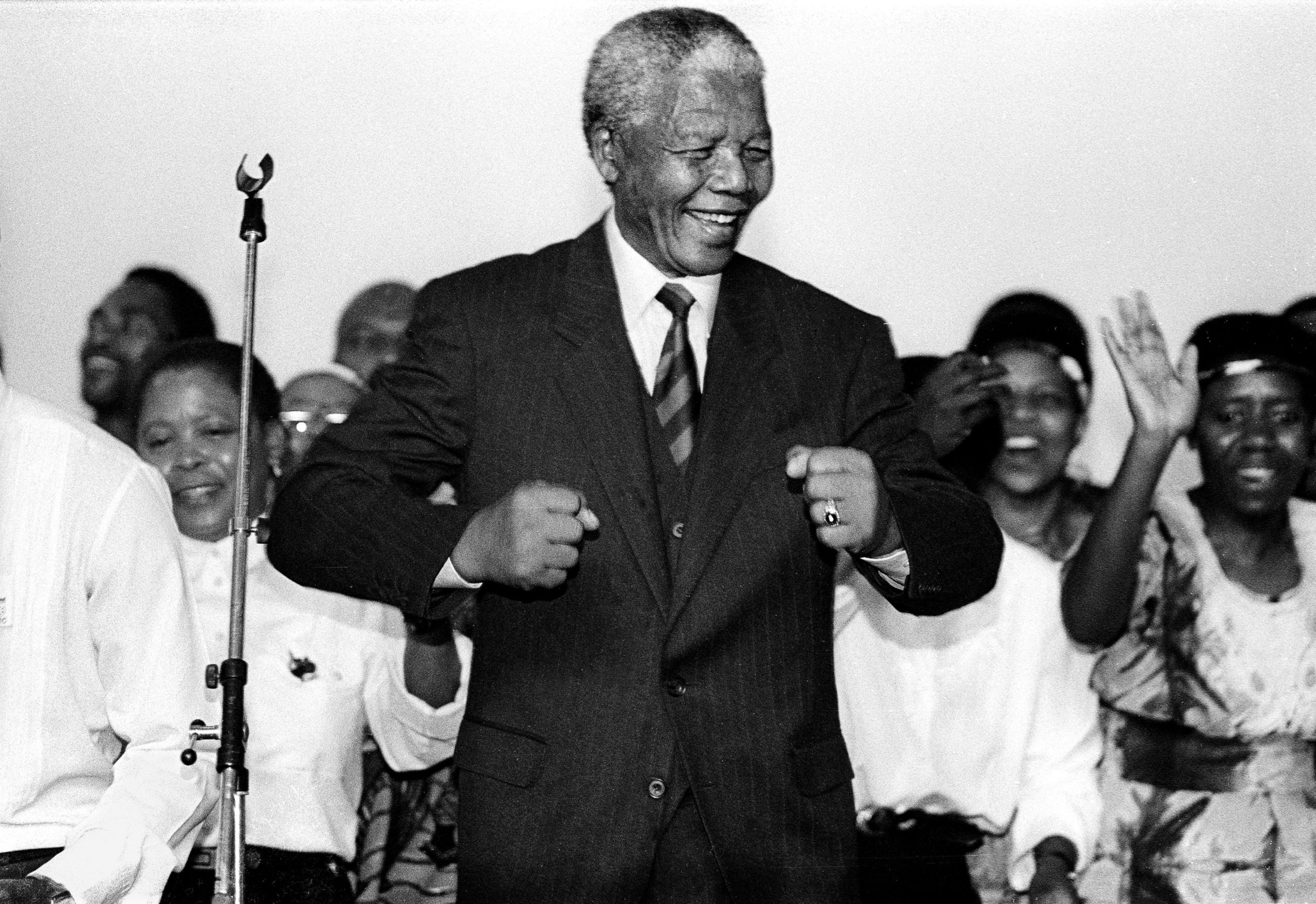The first New History of South Africa, meant for ordinary South Africans, was published in 2007 — two years before Jacob Zuma became the fourth president of democratic South Africa. The future of the country was uncertain.
Since then, the once anti-apartheid prisoner “again fell foul of the law”, as put in the pages of the epilogue in the updated second edition of “New History of South Africa”.
The ANC has since gained new leadership, which is not entirely united in 2022. This rewrite of history shows that South Africa is a good test of character, but it closes as its first: open-ended.
The new “New History of South Africa”, published earlier this year in May, is voiced by some 34 contributors, who collectively retell the extensive political, economic, social and cultural history of the country.
 Campaign posters for the 2021 local government elections. (Photo: Gallo Images / Beeld / Deaan Vivier)
Campaign posters for the 2021 local government elections. (Photo: Gallo Images / Beeld / Deaan Vivier)
It begins with our deep past, the first people, tracing marks of tools and art made and left to be discovered, before covering the Dutch and British Settlements, the Mfecane, the origins of African nationalism, the roots of segregation, the South African War and the World Wars, apartheid South Africa, the road to liberation, Marikana, and ends in our current state — a global pandemic, a crashing economy and the 2021 local elections.
 Family members and members of Wonderkop informal settlement gather on a hillside overlooking the scene of the massacre following a memorial service held in honour of Lonmin mineworkers who were killed by police on 16 August 2012. (Photo: EPA / STR)
Family members and members of Wonderkop informal settlement gather on a hillside overlooking the scene of the massacre following a memorial service held in honour of Lonmin mineworkers who were killed by police on 16 August 2012. (Photo: EPA / STR)
This list does not entirely encompass South Africa’s vast saga in the 650-odd pages of the hefty book. Even so, according to professor and historian Bill Nasson, “history always, sort of, leaves things out”.
Nasson is one of the veteran historians who formed part of the editorship of the book, alongside authors Hermann Giliomee and Bernard Mbenga.
The idea was to cover the political economy of the country accessibly, says Nasson. The book is therefore not directly intended for historians, as was the case for its first edition, but rather for “the general reader”.
Importantly, for a book that touches on the building blocks of South Africa’s past, it is also intended for the country’s children — in school classrooms and on family shelves.
The book lends itself to be read not as a typical non-fiction narrative, but sporadically, jumping through colour-coded sections that devise the past into readable, easy-to-navigate chunks.
Things have indeed been left out. Like the absence of a determiner in its title that usually accompanies a work like this.
“We wanted to avoid using [an article] calling it ‘The New History’ or ‘A New History,” Nasson tells Daily Maverick. “History can’t be definitive in that kind of way.”
Authors’ names are also excluded from their chapters.
“[The editors wanted] to de-link the identity of the author to the history, with the idea that you read the chapter and then you scratch around and check the contributors and see who has done what,” Nasson says. Every detail, it seems, is intentionally so.
Retelling history
History, Nasson says, is always changing.
There was a need for a historical account of current issues like land rights and gender-based violence, which weren’t covered in the first edition, says Nasson.
 Nelson Mandela smiles as he attends an ANC victory march in 1994 in Johannesburg, South Africa. (Photo: Gallo Images / Paul Weinberg)
Nelson Mandela smiles as he attends an ANC victory march in 1994 in Johannesburg, South Africa. (Photo: Gallo Images / Paul Weinberg)
“We are always reinterpreting things or viewing things differently,” he says. “If we were talking about 1994 in the year 2000, you would take a particular view…I think now you might look at [1994] slightly differently.”
Giliomee adds that the problem with writing history is that there is never a “final or correct version of history”.
“People have the idea that history is set, but it is always changing and we have to incorporate new perspectives.”
Possibly a very ‘new perspective’ is the section on migration in the book, which places everyone in South Africa as being in one way or the other a migrant.
Nasson says, “it [identifies] South Africans as all coming from a place of migration. I think that that’s actually quite present-minded for the country, now in its social economic place.”
Agreeing, “there is no way [in South Africa] that any race or history could exist by itself,” says Giliomee. “[We] exist in combination and live together”, he says.
Deeply political
In the book’s final pages, South Africa is portrayed as a remarkable place — a sentiment familiar to many who call it home.
In South Africa, there is religious freedom and warmth from its people, braais and Nobel Prizes, the Kreepy Krauly and medical breakthroughs, cultural diversity and great sport, and the red grape varietal giving us Pinotage. And of course, lots of biltong.
So Nasson puts it in the book’s epilogue — a piece of writing that Nasson admits was some of his most difficult work.
But the book’s conclusion also evidences a distinct parallel South Africa shares with other nations: obsession with the burden of the past.
To sum up New History of South Africa, Nasson provides a quote he believes deeply in. The line from conservative South African poet, Roy Campbell, goes:
South Africa: Renowned both far and wide for politics, and little else beside.
There are many other countries just like South Africa.
What’s striking, however, is that South Africa seemingly muddles along, despite its government, Nasson says. “Almost as if its salvation is just in ordinary people.”
Likewise, Giliomee says, in the words (a paraphrase of Jan Smuts) of a sociologist friend of his, that “in South Africa, neither the best nor the worst ever happens”.
The worst could have happened, by now.
South Africa is now a full democracy, and a full democracy is more difficult to manage than a limited one as it once was, says Giliomee.
“To some extent, the historian can show that South Africa is, in fact, a state that was never supposed to be highly successful,” Giliomee tells. “The best we could have hoped for is to be a very workman-like and efficient state, but we could never be a USA because we lack the resources.”
When the time comes for a next edition, Giliomee supposes he will no longer do the editorship. “I wish best of luck to my successor,” he says. DM
Rebecca Pitt is a regular freelance contributor to Daily Maverick and a PhD candidate in Linguistics.




 Nelson Mandela smiles as he attends an ANC victory march in 1994 in Johannesburg, South Africa. (Photo: Gallo Images / Paul Weinberg)
Nelson Mandela smiles as he attends an ANC victory march in 1994 in Johannesburg, South Africa. (Photo: Gallo Images / Paul Weinberg)